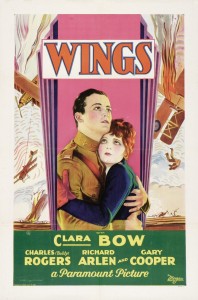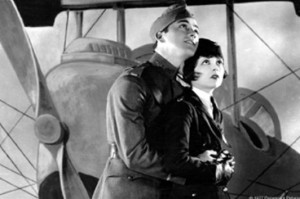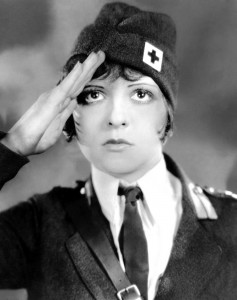




The first Best Picture Oscar-winner, Wings, is the only silent feature to receive the coveted award, which was given in 1929 for best film achievements in 1927-1928.
The movie was in production for over a year because of its technically demanding aerial sequences and was the most expensive ($2 million) at the time.
The first collaborative effort between Hollywood and the Air Force, the film enjoyed the latter’s assistance on the condition that the movie projects a positive image of the military. It was just the beginning of a more intimate and extensive connection between the Hollywood film industry and the Administration during the Second World War.
Though released close to a decade after WWI ended, Wings celebrated all the right values: heroism, action, and male camaraderie. Charles “Buddy” Rogers and Richard Allen play small-town friends who enlist in the Air Force. The It Girl, Clara Bow, plays the hometown girl in love with Rogers, who’s smitten with another girl.
 Based on a story by John Monk Saunders, the film was written by Hope Loring and Louis D. Lighton, and directed by William A. Wellman, who was not nominated. One of Hollywood’s most reliable craftsmen, Wellman would receive one Oscar nomination, for the war picture “Battleground,” in 1949.
Based on a story by John Monk Saunders, the film was written by Hope Loring and Louis D. Lighton, and directed by William A. Wellman, who was not nominated. One of Hollywood’s most reliable craftsmen, Wellman would receive one Oscar nomination, for the war picture “Battleground,” in 1949.
When the U.S. enters WWI, Jack Powell (Charles “Buddy” Rogers) and David Armstrong (Richard Arlen) join the Air Service. Jack is loved by Mary (Clara Bow), but carries a locket from Sylvia (Jobyna Ralston), who sent it to David, whom she loves. Rivalry between the men arouses deep enmity, but events at training camp lead to a growing friendship. Later on, Mary joins a truck outfit and is sent to France, and the duo are decorated for bravery, although Jack is threatened with a court martial until Mary sacrifices her reputation and is sent home.
 At camp, Jack and David, arguing over Sylvia, are interrupted by orders to attack observation balloons. During this engagement, David is shot down, but escapes alive. The next day, he steals a German plane from a nearby base and crosses into their territory. Meanwhile, a German aviator brings word to the American camp that David is dead. Filled with regret, Jack takes off and terrorizes German forces all day. Returning home, he spots a German plane and, unaware that David is its pilot, shoots it down.
At camp, Jack and David, arguing over Sylvia, are interrupted by orders to attack observation balloons. During this engagement, David is shot down, but escapes alive. The next day, he steals a German plane from a nearby base and crosses into their territory. Meanwhile, a German aviator brings word to the American camp that David is dead. Filled with regret, Jack takes off and terrorizes German forces all day. Returning home, he spots a German plane and, unaware that David is its pilot, shoots it down.
 The dying David is taken into a small French farmhouse. Jack lands and realizes he had shot down David, who dies in his arms. Going through his friend’s belongings, Jack learns of Sylvia’s love for David. Back home, later, after the war, Jack discovers his love for Mary.
The dying David is taken into a small French farmhouse. Jack lands and realizes he had shot down David, who dies in his arms. Going through his friend’s belongings, Jack learns of Sylvia’s love for David. Back home, later, after the war, Jack discovers his love for Mary.
 The spectacular aerial scenes, which are still exciting to watch, were shot near San Antonio by a crew of pilots that included Rogers and Arlen. Paramount Famous Lasky, as the studio was called then, made a big deal out of the fact that Arlen had been a flier with the Royal Flying Corps, and that they spent a lot of money on instructing Rogers how to fly for the film.
The spectacular aerial scenes, which are still exciting to watch, were shot near San Antonio by a crew of pilots that included Rogers and Arlen. Paramount Famous Lasky, as the studio was called then, made a big deal out of the fact that Arlen had been a flier with the Royal Flying Corps, and that they spent a lot of money on instructing Rogers how to fly for the film.
The very young Gary Cooper plays a secondary role, that of a cadet. In the 1930s, he would become a Hollywood leading man and a major star for three decades–until his death in 1960.
Hedda Hopper, who would become one of Hollywood’s two main gossipers (the other is Louella Parsons) played a cameo in the film.
Oscar Alert
In 1927-8, the five Best Picture nominees were: “The Last Command,” “The Racket,” “Seventh Heaven,” “The Way of All Flesh,” and “Wings.”
Oscar Context
Winning the Best Picture for the year 1927-1928, “Wings” also won the Best Engineering Effects Oscar by Roy Pomeroy.
Nonetheless, another film, Murnau’s “Sunrise,” was honored for its “Artistic Quality of Production,” which tarnished the glory of “Wings,” since some considered it a Best Picture as well.
Wings failed to win the Best Adapted Screenplay, which went to “Seventh Heaven,” and was not even nominated for Best Original Story, which was earned by “Underworld.”
Cast:
Clara Bow (Mary Preston)
Charles “Buddy” Rogers (Jack Powell)
Richard Arlen (David Armstrong)
Jobyna Ralston (Sylvia Lewis)
Gary Cooper (Cadet White)
Arlette Marchal (Celeste)
El Brendel (Herman Schwimpf)
“Gunboat” Smith (the Sergeant)
Richard Tucker (Air Commander)
Julia Swayne Gordon (Mrs. Armstrong)
Henry B. Walthall (Mr. Armstrong)
George Irving (Mr. Powell)
Hedda Hopper (Mrs. Powell)
Nigel de Brulier (Peasant)
Roscoe Karns (Lt. Cameron)
James Pierce (MP)
Carl Von Haartman (German Officer)
Credits:
A Paramount Picture.
Director: William A. Wellman.
Producer: Lucien Hubbard.
Scenario: Hope Loring, Louis D. Lighton, Based on an original story by John Monk Saunders.
Camera: Harry Perry.
Editor: Lucien Hubbard.
Engineering Effects: Roy Pomeroy.
Associate Producer: B.P. Schulberg.
Titler: Julian Johnson.
Editor-in-Chief: E. Lloyd Sheldon.
Musical Score: John S. Zamecnik.
Assistant Director: Richard Johnston.
Aerial Cinematographers: E. Burton Steene, Al Williams, Sergeant Ward.
Aerial Cameramen: Herman Schoop, Gene O. Donnell, Faxon M. Dean, Russell Harlan, Paul Perry, Art Lane, Cliff Blackstone, Harry Mason, Ray Olsen, Bert Baldridge, Al Meyers, William Clothier, Guy Bennett, L. Guy Wilky, Frank Cotner, Ernest Lazell (Laszlo).










